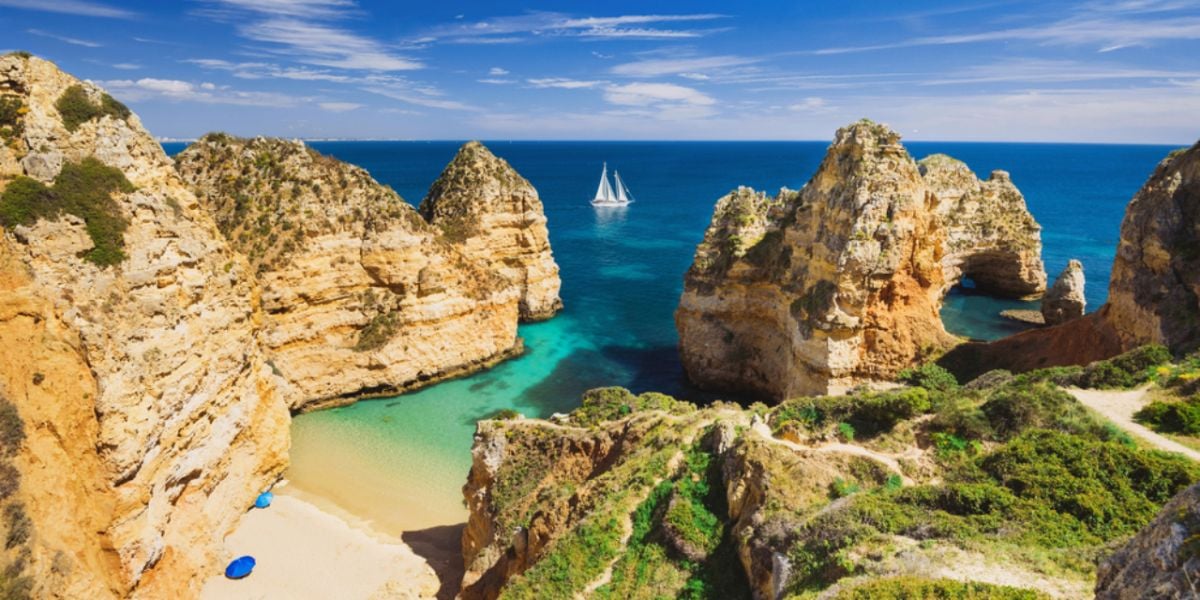
If you are planning to visit or relocate to Portugal, it is important to be aware of the visa and entry requirements. Portugal is a member of the European Union and of the Schengen space, meaning EU passport holders and residents of certain countries who have a visa-waiver program with Portugal are able to enter the country for up to 90 days with no visa required. Non-EU passport holders may require a visa to enter Portugal.

Portugal visa requirements
EU passport holders and residents
If you are a citizen of an EU/EEA member state, you can travel, live and work in Portugal without a visa or a work permit. However, if you plan to stay in the country for more than 3 months, you will need a Registration Certificate, which is basically a residency permit for EU/EEA nationals living in Portugal. You can apply to your local city council by submitting the appropriate form alongside your ID.
Moreover, you will also need a written declaration stating that you are self-employed or work for a company based in the country; that you have health insurance and sufficient funds to support yourself during your stay; that you study in Portugal and have enough money for the duration of your cycle of studios; or that you are moving into the country to reunite with a family member that also fulfills one of the aforementioned clauses. Keep in mind, you only need to declare you abide by one of these statements.
Good to know:
Foreign citizens living within the Schengen space who wish to enter Portugal must produce a residence permit in their country of residence, as well as a valid passport. They also have to present their Schengen visa and justify their stay in Portugal. Reasons can be for tourism, religious, family, scientific, cultural, professional, business or political purposes.
Non-EU residents
Those who intend to stay for more than 12 months in Portugal will need to apply for a long-stay visa. They will be eligible for either a resident visa or a temporary stay visa. You can obtain these visas from the Portuguese Embassy or Consulate in your country of residence.
The long-stay visa is applicable to foreigners moving to Portugal for medical treatment, retirement, studies, professional or religious training, research, teaching, high-profile jobs, investment or entrepreneurship. In most cases, you will first need to obtain a work contract and then use it to apply for a work permit via a Portuguese embassy in your country.
Note that even if you don't need a visa for a short stay in Portugal, you will still need to apply for a long-term visa or residence permit if you plan to stay in the country for over three months. Unlike EU/EEA nationals, you will need to apply for such a visa/residence permit BEFORE arriving in Portugal.
Do I need a visa to travel to Portugal?
Citizens coming from the following countries do not require a visa to travel to Portugal:
Albania, Andorra, Antigua and Barbuda, Argentina, Australia, Austria, Bahamas, Barbados, Belgium, Bosnia and Herzegovina, Brazil, Brunei, Bulgaria, Canada, Chile, Colombia, Costa Rica, Croatia, Cyprus, Czech Republic, Denmark, Dominica, El Salvador, Estonia, Finland, France, Georgia, Germany, Gibraltar, Greece, Grenada, Guatemala, Honduras, Hungary, Iceland, Ireland, Israel, Italy, Japan, Latvia, Liechtenstein, Lithuania, Luxembourg, Kiribati, Kosovo, Malaysia, Malta, Marshall Islands, Mexico, Micronesia, Moldova, Monaco, Montenegro, Netherlands, New Zealand, Nicaragua, North Macedonia, Norway, Palau, Panama, Paraguay, Peru, Romania, Samoa, San Marino, Serbia, Seychelles, Singapore, Slovakia, Slovenia, Solomon Islands, South Korea, St Kitts and Nevis, St Lucia, St Vincent and the Grenadines, Spain, Sweden, Switzerland, Taiwan, Timor Leste, Tonga, Trinidad and Tobago, Tuvalu, Ukraine, United Arab Emirates, United Kingdom, United States, Uruguay, Vatican City, Venezuela, Hong Kong Special Administrative Region and Macao Special Administrative Region.
Citizens holding passports from the following countries have to obtain a visa before traveling to Portugal, even for tourism:
Afghanistan, Algeria, Angola, Armenia, Azerbaijan, Bahrain, Bangladesh, Belarus, Belize, Benin, Bhutan, Bolivia, Botswana, Burkina Faso, Burundi, Cambodia, Cameroon, Cape Verde, Central African Republic, Chad, China, Comoros, Congo, Cuba, Democratic Republic Of Congo, Djibouti, Dominican Republic, Ecuador, Egypt, Equatorial Guinea, Eritrea, Eswatini, Ethiopia, Fiji, Gabon, Gambia, Ghana, Guinea, Guinea-Bissau, Guyana, Haiti, India, Indonesia, Iran, Iraq, Ivory Coast, Jamaica, Jordan, Kazakhstan, Kenya, Kuwait, Kyrgyzstan, Laos, Lebanon, Lesotho, Liberia, Libya, Madagascar, Malawi, Maldives, Mali, Mauritania, Mongolia, Morocco, Mozambique, Myanmar, Namibia, Nauru, Nepal, Niger, Nigeria, North Korea, Oman, Pakistan, Palestine, Papua New Guinea, Philippines, Qatar, Russia, Rwanda, Sao Tome and Principe, Saudi Arabia, Senegal, Sierra Leone, Somalia, South Africa, South Suda, Sri Lanka, Sudan, Suriname, Syria, Tajikistan, Tanzania, Thailand, Togo, Tunisia, Turkey, Turkmenistan, Uganda, Uzbekistan, Vanuatu, Vietnam, Yemen, Zambia and Zimbabwe.
Do you need a visa to study in Portugal?
If you're an EU citizen (plus Switzerland, Iceland, Liechtenstein and Norway) you do not need to apply for a student visa in Portugal. In fact, if staying for less than 3 months, you don't have to worry about any bureaucratic requirements. However, should your cycle of studies in the country last longer than the aforementioned 3 months, it is mandatory to register your stay with local authorities. To get a registration certificate, students will need to apply at their local council within 30 days after completing three months of arriving in Portugal. This certificate costs 15€ and is valid for the entire stay of the student in the country, being issued immediately upon request. To complete the application, candidates need to present a valid ID document, a written affidavit declaring that they are enrolled in an officially recognized school in the country, proof of financial subsistence and proof of health insurance (only if your country requires the same for Portuguese students).
On the other hand, if you come from outside the EU/EEA, you'll probably need a student visa. The only exception applies to citizens who are staying for less than 3 months AND come from one of the 63 visa-exempt countries, such as the US, the UK, Canada or Japan. Nonetheless, students from countries that require a Schengen visa or are planning to stay longer than 90 days (regardless of nationality) will have to apply for a student visa. To do so, you will need to get a letter of acceptance from the university you wish to enroll in and get in touch with the Portuguese Embassy in your country of residence. After scheduling your interview at the embassy, you'll fill out the application form, submit all the required documentation in person, and pay the 90€ visa fee. Once you get a positive response and the magic sticker on your passport (it might take up to 3 months—worst-case scenario), you can take care of travel arrangements.
Keep in mind that the student visa is only valid for 3 months, which is why you will also need to obtain a residence permit if you're staying longer than 90 days. After your visa expires, this permit will allow you to remain in the country legally. To do so, you'll have to book an appointment at your nearest AIMA office. The Agência para a Integração, Migrações e Asilo (AIMA) was created in late 2023 as the entity responsible for managing migration processes in Portugal.
Good to know:
Non-EU residents will need to apply for a student-based residence permit (called a D4 visa) in their home countries via a Portuguese consulate or embassy. Depending on the instructions provided by the consulate/embassy, applications may also be submitted in the e-visa portal or through third-party VFS Global.
Other visas for Portugal
If you're not coming to Portugal to work or to study (including volunteering or participating in an internship), there are other visas you may apply for.
For example, there are health visas for people coming for treatment in Portugal and their accompanying family members; retiree visas for people living off their pensions; visas for people living on their own income; religious visas for people who are part of a congregation and are coming to Portugal for religious studies or training; and even Youth Mobility Agreements.
Obviously, people who share the household with a citizen who successfully applied for a Portuguese visa can also come to the country on a residency visa. This visa is part of a program called “Reagrupamento Familiar” and is currently undergoing a huge renovation. As of now, a new project has been submitted to make it a lot harder for legal immigrants and expats to bring their families to Portugal. However, the Supreme Court has deemed this legislation unconstitutional, though the ruling parties are expected to make some changes and resubmit the project.
For now, though, the “Reagrupamento Familiar” is destined to spouses, children and immediate family members who live with the visa holder. Obviously, applicants need to show proof of their family links, as well as proof of accommodation. Once the request is submitted, AIMA will have 90 days to notify the applicant of their decision.
Applying for a visa to Portugal: required documents
Documents required during the visa application process may vary from one country to another and also according to the visa type. In general, though, you will need the following:
- Completed and signed visa application form;
- Passport size identity photo(s);
- A valid passport containing at least one blank page;
- Proof of accommodation for your stay in the country;
- Proof of sufficient funds to support you during your stay in the country;
- Proof of return airfare purchase or onward travel out of the country;
- Proof of travel/health insurance;
- Documents justifying the purpose of your visit;
- Visa application fees, if required.
We do our best to provide accurate and up to date information. However, if you have noticed any inaccuracies in this article, please let us know in the comments section below.








